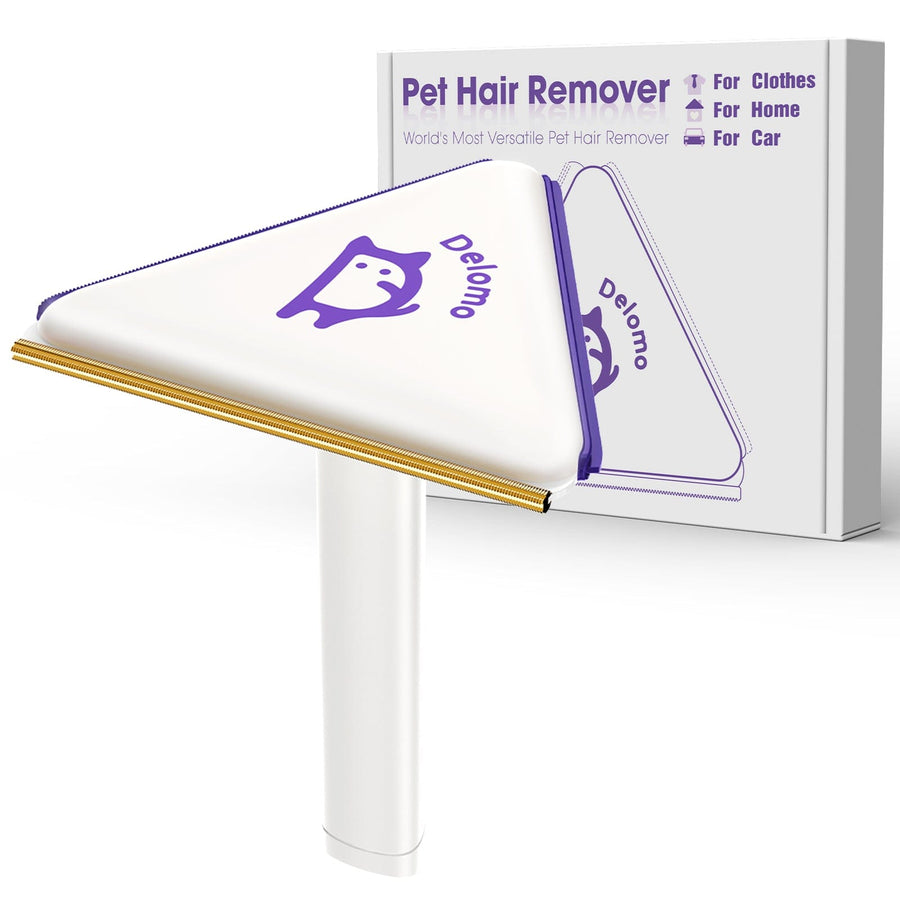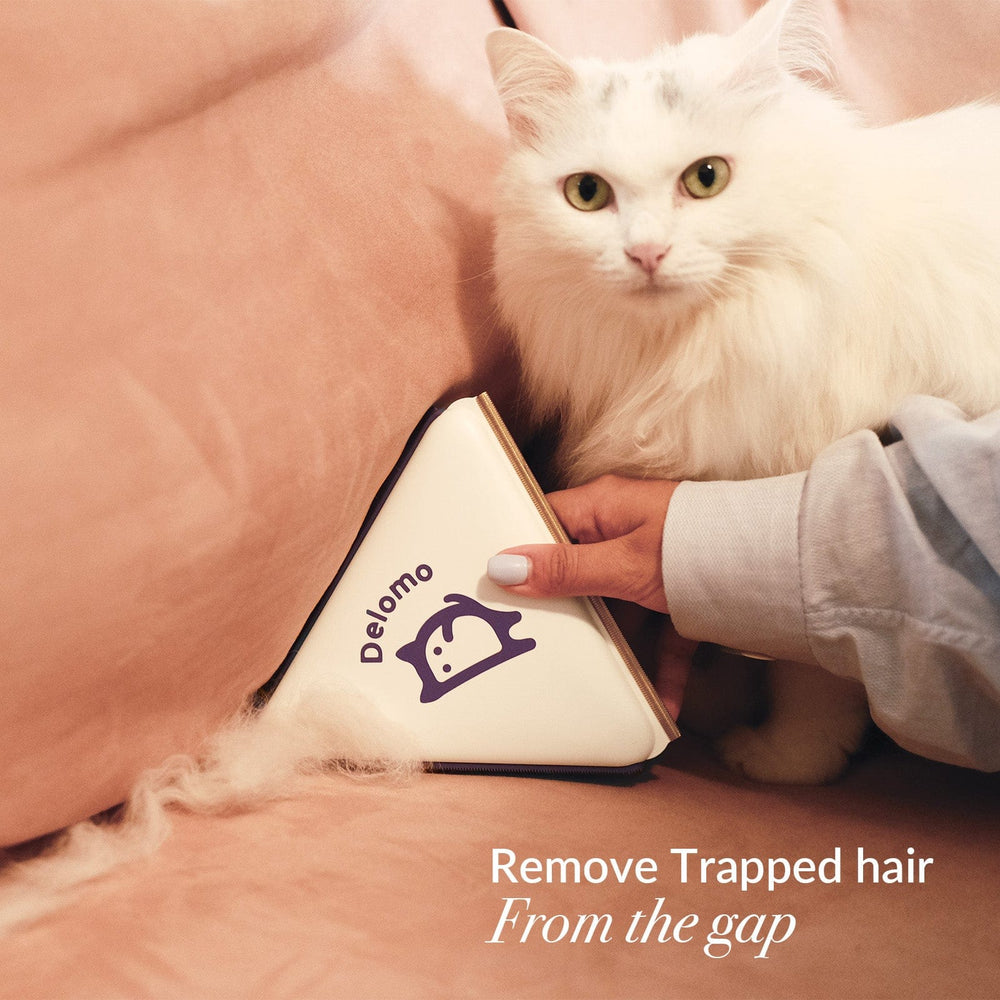Why My Pet is Losing Hair
At DELEMO, we focus a lot on pets and hair. We often talk about the best ways to groom or collect hair, as well as reasons why hair is falling out excessively.
Up until now though, we’ve mostly focused on our loving canine companions. Now, it is time to take a look at our feline pets and take a look at why your cat is losing hair at unnatural rates or ways.
On Cats and Hair
It’s no secret that cats groom themselves. In fact, they’re pretty darn good at it. Licking their fur keeps them clean and cool and helps to remove any loose hairs before they have a chance to shed and be scattered around your home.
Studies show that cats typically groom themselves via licking between a third to a half of each day. Their innate grooming naturally dislodges any fur to maintain their bodies and their fur. Despite this, some factors come into play when it comes to the shedding of cat hair.
Fur Types and Seasons
All cats, regardless of breed, will shed some fur. The amount of fur that is shed depends on the individual cat’s coat type as well as the time of year. There are three types of fur coats that cats can have: single, double, and triple coats.
A single coat is what you typically think of when you think of a “normal” cat coat. It’s one layer of fur that lies close to their skin.
Double coats have two layers: a dense undercoat and a less dense outer coat.
And finally, triple coats have three layers: a dense undercoat, a less dense outer coat, and Guard hairs (longer hairs that lay over the top).
The amount of shedding also changes depending on the time of year. Most cats will shed more in the spring as they prepare for summer. They’ll also shed more in the fall as they prepare for winter.
While it is normal for cats to shed some fur, there are certain situations where your cat may be losing hair at an abnormal rate. If you suspect that your cat is shedding more than usual, it’s important to take a closer look to determine the underlying cause.
Why Your Cat is Losing Hair Excessively
There are many reasons why your cat may be losing hair excessively. Here are the most common reasons.
Allergies
One of the most common reasons for cats to lose hair is allergies. Cats can be allergic to a variety of things, including pollen, grass, dust mites, and certain foods. They can also be allergic to flea bites. If your cat is scratching a lot or seems to be in discomfort, it’s possible that they’re dealing with an allergy.
The most common cat allergy is atopy, which is an allergy to airborne particles like pollen or dust. If your cat has atopy, it’ll likely have itchiness around its face, ears, and paws. They may also have watery eyes and a runny nose.
Another common allergy is flea bites. If your cat is allergic to flea bites, it’ll likely have excessive itching and hair loss around its tail and hind legs.
If you think your cat may be dealing with allergies, the best course of action is to take them to the vet. The vet will be able to determine if allergies are the underlying cause and can provide you with options for treatment.
Stress
Just like humans, cats can experience stress. And just like humans, when cats are stressed, it can lead to hair loss. While we may not always know what’s stressing our cats out, there are some common causes of stress in cats.
One common cause of stress in cats is moving to a new home. This can be a stressful event for your cat, as they’re suddenly in a new environment with new sights, sounds, and smells.
Another common cause of stress in cats is the introduction of a new pet into the home. This can be especially stressful for cats that are used to being the only pet in the house.
If you think your cat may be stressed, there are some things you can do to help them relax. You can try providing them with a quiet place to hide, like a box or a cave-style bed. You can also try using Feliway, which is a product that emits calming pheromones.
If nothing seems to be working, it may be time to bring them to the vet.
Parasites
One of the more common reasons for hair loss in cats is parasites. Parasites are small creatures that live off of other animals, and they can cause a variety of health problems in cats. The most common type of parasite that affects cats is fleas. Fleas are small, wingless insects that feed on the blood of animals. If your cat has fleas, it’ll likely have excessive itching and scratching. In severe cases, fleas can lead to anemia.
Another common type of parasite is ear mites. Ear mites are tiny parasites that live in the ears of animals. If your cat has ear mites, they’ll likely have itchiness in their ears, as well as a black discharge.
Hormonal Imbalance
Another possible reason for hair loss in cats is a hormonal imbalance. This can be caused by a variety of things, including stress, pregnancy, and certain medical conditions.
One common medical condition that can cause a hormonal imbalance is hyperthyroidism. Hyperthyroidism is a condition where there’s an overproduction of the hormone thyroxine. This can lead to a variety of symptoms, including weight loss, increased appetite, and hair loss.
If you think your cat may have a hormonal imbalance, the best thing to do is to take them to the vet. The vet will be able to run tests and determine if a hormonal imbalance is an underlying cause.
Medical Conditions
There are a variety of medical conditions that can cause hair loss in cats. Some of the more common ones include ringworm, mange, and alopecia.
Ringworm is a fungal infection that affects the skin. It’s most commonly found on the head, ears, and legs. If your cat has ringworm, it’ll likely have bald patches on its skin.
Mange is a skin condition that’s caused by mites. There are two types of mange: demodectic and sarcoptic. Demodectic mange is the more common type and it typically affects young cats. Sarcoptic mange is less common but it’s more severe. If your cat has mange, they’ll likely have hair loss, as well as itchiness and redness of the skin.
Alopecia is a condition that causes hair loss. There are several types of alopecia, including autoimmune alopecia and hormonal alopecia. If your cat has alopecia, it’ll likely have bald patches on its skin.
Keep Your Felines Fine
It’s quite normal for cats to shed hair. In fact, they shed more than dogs do! While shedding is a natural process, there are some instances where it can be excessive.
The reasons we’ve illustrated above show you just how worrying it is when your cat is losing hair excessively.
It is always important to stay aware and watch your feline pet closely. See if there are any patches of lost hair on their bodies, and if you are unable to pinpoint the reason, take them to the vet immediately to remedy the situation.



Leave a comment